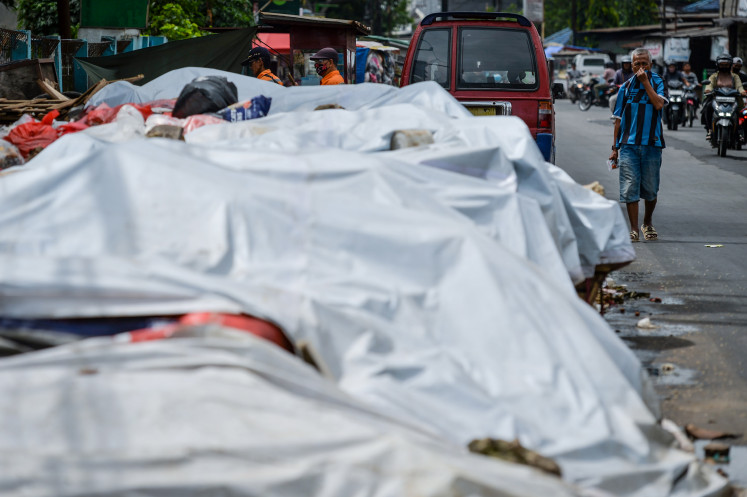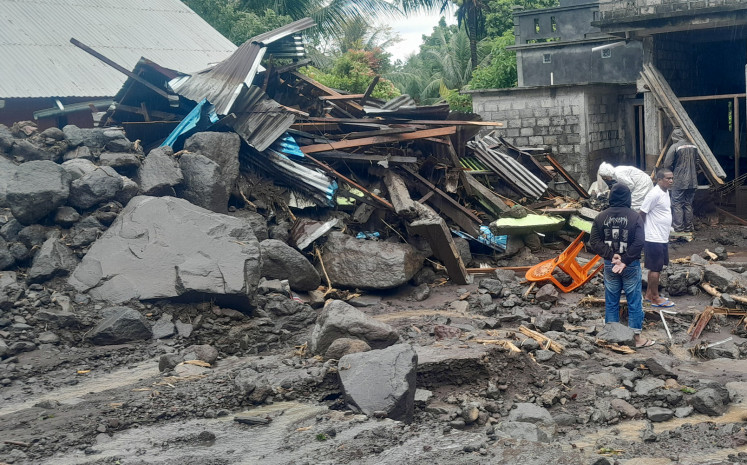Popular Reads
Top Results
Can't find what you're looking for?
View all search resultsPopular Reads
Top Results
Can't find what you're looking for?
View all search resultsE-waste flooding developing countries, warns UNEP report
Developing countries face serious environmental and health problems from the alarming increase in hazardous waste from electronic devices, a report launched Monday by the United Nations Environment Programme (UNEP) warned
Change text size
Gift Premium Articles
to Anyone
D
eveloping countries face serious environmental and health problems from the alarming increase in hazardous waste from electronic devices, a report launched Monday by the United Nations Environment Programme (UNEP) warned.
The report, "Recycling - From E-waste to Resources", listed old and dilapidated desktop and laptop computers, printers, mobile phones, pagers, digital photo and music devices, refrigerators, toys and televisions as main sources of waste.
It used data from 11 representative developing countries in Asia, Africa and Latin America to estimate current and future e-waste generation.
"Developing countries will face rising environmental damage and health problems if e-waste recycling is left to the vagaries of the informal sector, unless action is stepped up to properly collect and recycle materials," said UNEP executive director Achim Steiner.
"It is urgent to establish an ambitious, formal and regulated process for collecting and managing e-waste by setting up large and efficient facilities.
"By acting now and planning forward, many countries can turn an e-challenge into an e-opportunity."
The report was revealed at the newly opened three-day meeting of the Basel Convention and other world chemical authorities prior to the UNEP Governing Council meeting in Nusa Dua, Bali, later this week.
The report said China produced about 2.3 million tons of e-waste domestically a year, second only to the United States with 3 million tons.
By 2020, e-waste from old computers in South Africa and China is predicted to jump by 200 and 400 percent respectively from 2007 levels, and by 500 percent in India.
By the same year in China, e-waste from discarded mobile phones will be about seven times higher than 2007 levels, and 18 time higher in India, the report says.
More e-waste is expected to be dumped in developing countries in the wake of rocketing sales and aggressive marketing of cell phones and other electronic appliances.
Steiner said the environmental agenda in the 21st century was not about telling people to switch off, but to ensure those who buy a computer, a cell phone or other electronic product also took responsibility for the consequences of e-waste-related issues.
"What we're trying to do is not to stop people from buying those goods, but to make them safer so that people don't suffer in terms of health and environment," he told The Jakarta Post later.
"That's why we have to tackle *the e-waste problem* both at national and international levels. Buy safer products; companies have to accept responsibility for recycling and governments must put incentives in place, because if they don't, then very soon the world will say they won't buy these products because they're too dangerous."
Jim Puckett, from the Basel Action Network, said around 50 to 100 containers of e-waste went into Chinese ports each year.
"We also checked recycling facilities in the United States and found they didn't do recycling," he said.
"Consumers unwittingly think they do the right thing by handing them over to recycling facilities, when in fact the companies simply load up the waste in container ships and send them mostly to China."
Recently, he said, the network had tracked nine containers of hazardous e-waste from one such facility in the United States and found the containers were shipped to Indonesia, but managed to foil the attempt by calling Indonesian authorities.
The containers were then sent back to the United States.










